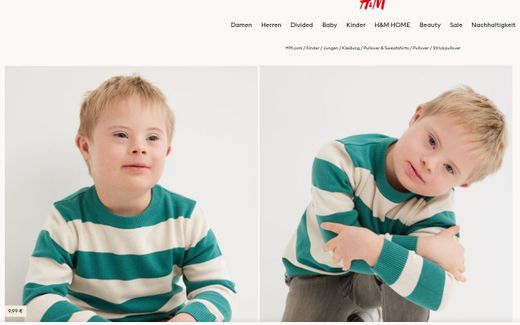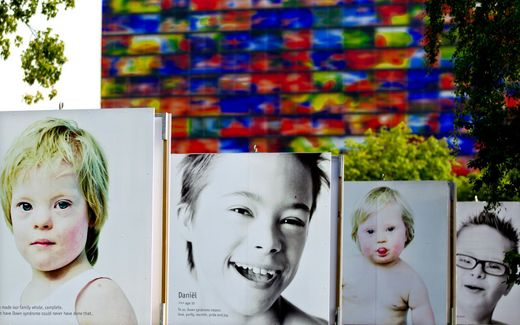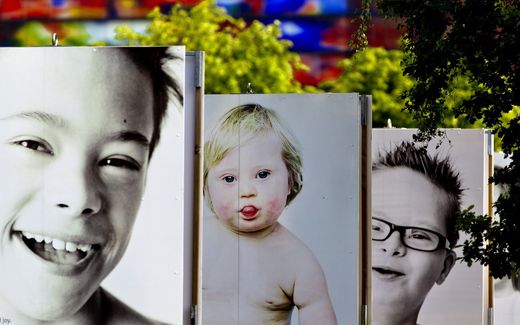Christian daycare for disabled children is a beacon of calm amidst war
21-03-2023
Eastern Europe
Hanneke Klein-den Hertog, RD
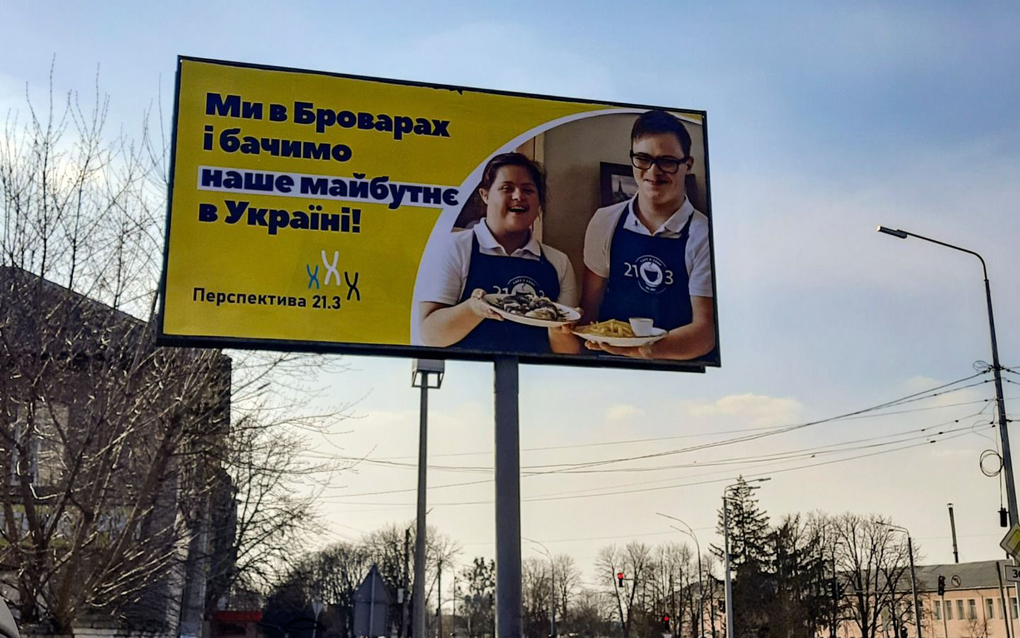
"We are in Brovary and see our future in Ukraine." Even during the war, work among young people with Down syndrome continues, billboards in Brovary tell. Photo Vasylenko family
Eastern Europe
Billboards with smiling faces of young people with Down Syndrome are brightening up the streets of Brovary, near Kyiv. The organisation behind these advertisements, Perspectiva 21.3, wants to clarify one thing: "We carry on despite the war."
"What do you do if missiles suddenly fly over your head while picking up young people with intellectual disabilities from their homes in Kyiv for daycare in Brovary, half an hour away? Do you turn back? Do you drive on?" These are questions Arenda Vasylenko-van Ree has had to discuss with the parents of the nine young people attending daycare at Perspectiva 21.3 since the outbreak of war.
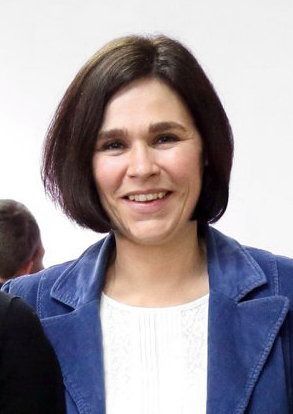
The Dutch woman married Ukrainian Andrey and had a son, Petro, in 2003. He turned out to have Down Syndrome. "Leave him here because such a child is useless anyway", the Vasylenko family was told in the hospital. Yet, they did take Petro home.
Since his birth, Andrey and Arenda have strongly advocated for the rights of children with Down Syndrome in Ukraine. They founded the organisation perspective 21.3. This designation refers to chromosome 21, of which a person with Down has 3. For this reason, World Down Syndrome Day also occurs every year on March 21st.
You placed billboards in Brovary with students from the daycare centre. Why?
"We want to send a message to the people of Brovary that we are continuing our work. Even though the Russians were a few kilometres away from the town, we stayed. I am convinced that you cannot suddenly stop providing daycare. For people with intellectual disabilities, that is not desirable. Then their development stands still."
When Russia invaded Ukraine over a year ago, many residents fled. Why did you stay?
"We believe that God has placed us here to do this work. That is why we continue. And we may do it in faith. It is a miracle that the Russians did not break through when there were few defenders. That is an answer to prayer."
In 2010, you said in the Dutch daily Reformatorisch Dagblad that the care for Ukrainian children with Down Syndrome was "extremely poor". How is that now?
"If you look at the statistics, you see a clear turnaround. When our son Petro was born in 2003, a maximum of 20 per cent of parents took their baby with Down Syndrome home from the hospital. The rest of the children disappeared into maternity hospitals, only to languish in children's homes and closed institutions. Nowadays, it is exactly the opposite: about 80 per cent of children with Down Syndrome are brought up at home. You see many more people with Down Syndrome here on the streets now than back then."
What is the goal of Perspectiva 21.3?
"We want to offer perspective to children and young people with disabilities. Currently, nine students, including our son Petro, attend daycare in Brovary. They are young people with Down Syndrome, other intellectual disabilities or autism. We want to prepare them to live as independently as possible."
What does that look like in concrete terms?
"The students take classes like maths and reading. All the lessons have a practical use. For example, it covers clock-watching, reading recipes, weighing things and following instructions. But students also learn how to build relationships and interact with each other and colleagues. This is often very basic: do you call your friends at night if you are awake, or is that not supposed to happen?
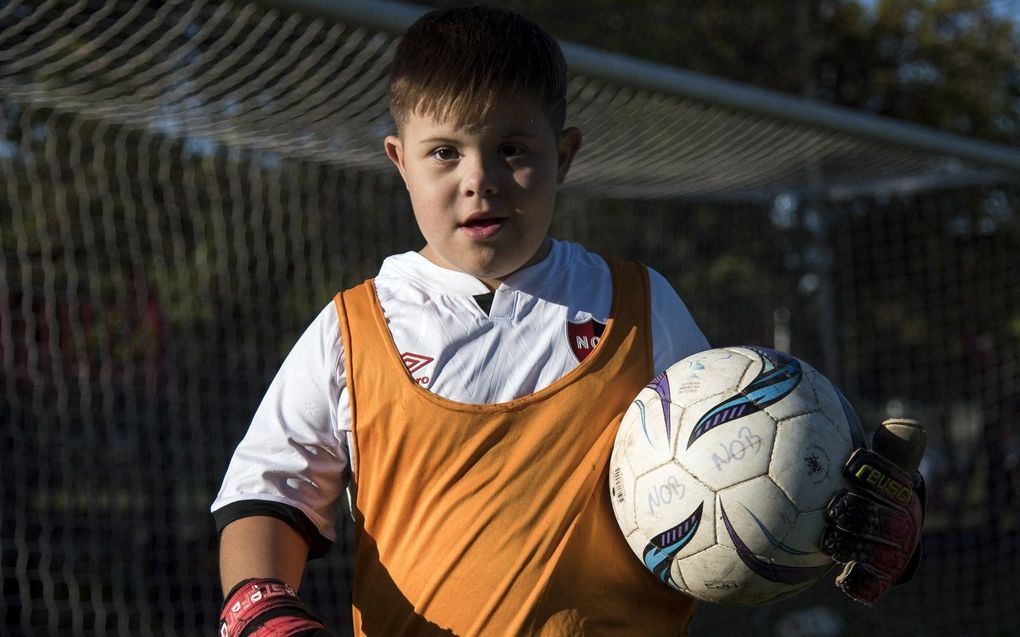
We are a Christian organisation. That permeates everything. We try to bring the Bible close to young people. When discussing the text "Love your neighbour", we discuss practical examples. If you are constantly talking through someone, how does that person feel? Would the Lord Jesus do the same? We also run a restaurant and a bakery, where students do internships."
What impact did the war have on the children?
"The first few days, it was all panic. Almost everyone, both colleagues and students, fled. We then distributed bread and soup in the eatery for a few months. From May, we again offered daycare a few days a week to the students back in town. After the summer, we could start all over again. Although the front is no longer so close, we still see much suffering daily, and the air alert still sounds regularly."
How do young people with intellectual disabilities experience these times?
"We do not keep the suffering away from them but try to explain in easy language what is happening. For instance, we took the young people to the villages around us where many buildings had been destroyed. I told them, "People are sad because their houses have been destroyed."
I find that the attitude of counsellors is very important. It affects the students. At daycare, we pray for protection when the siren sounds; then we move on quietly."
How do you keep going?
"Only with God's help, otherwise we wouldn't cope. Trusting in Him, we try to live our lives in war.
We see that students are developing. They are happy as well; that's what we do it for. Parents tell us that the daycare centre is a beacon of calm in the chaos and that the centre keeps the young people going. That is wonderful to hear.
The character of the students also helps us. Sure, they sometimes have quirks, but they are genuine and cheerful. The atmosphere in the group keeps me going."
This article was translated by CNE.news and published by the Dutch daily Reformatorisch Dagblad on March 21st, 2023.
Related Articles


